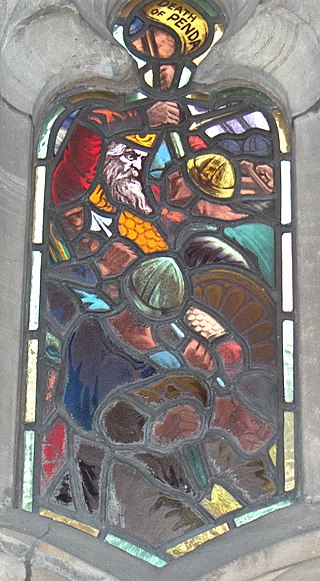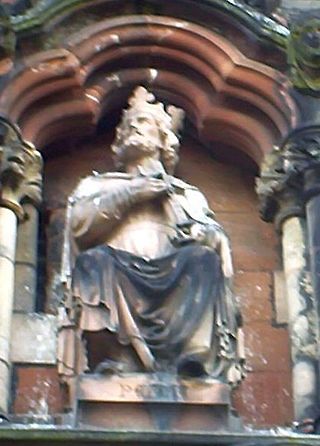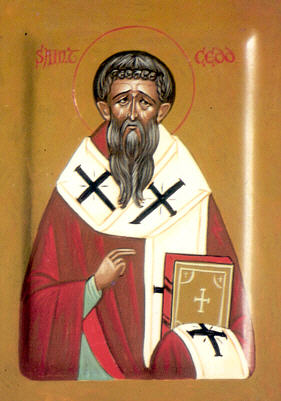Related Research Articles

Mercia was one of the three main Anglic kingdoms founded after Sub-Roman Britain was settled by Anglo-Saxons in an era called the Heptarchy. It was centred on the River Trent and its tributaries, in a region now known as the Midlands of England.

Æthelbald was the King of Mercia, in what is now the English Midlands from 716 until he was killed in 757. Æthelbald was the son of Alweo and thus a grandson of King Eowa. Æthelbald came to the throne after the death of his cousin, King Ceolred, who had driven him into exile. During his long reign, Mercia became the dominant kingdom of the Anglo-Saxons, and recovered the position of pre-eminence it had enjoyed during the strong reigns of Mercian kings Penda and Wulfhere between about 628 and 675.
Oswiu, also known as Oswy or Oswig, was King of Bernicia from 642 and of Northumbria from 654 until his death. He is notable for his role at the Synod of Whitby in 664, which ultimately brought the church in Northumbria into conformity with the wider Catholic Church.

Æthelred was king of Mercia from 675 until 704. He was the son of Penda of Mercia and came to the throne in 675, when his brother, Wulfhere of Mercia, died from an illness. Within a year of his accession he invaded Kent, where his armies destroyed the city of Rochester. In 679 he defeated his brother-in-law, Ecgfrith of Northumbria, at the Battle of the Trent: the battle was a major setback for the Northumbrians, and effectively ended their military involvement in English affairs south of the Humber. It also permanently returned the kingdom of Lindsey to Mercia's possession. However, Æthelred was unable to re-establish his predecessors' domination of southern Britain.

Wulfhere or Wulfar was King of Mercia from 658 until 675 AD. He was the first Christian king of all of Mercia, though it is not known when or how he converted from Anglo-Saxon paganism. His accession marked the end of Oswiu of Northumbria's overlordship of southern England, and Wulfhere extended his influence over much of that region. His campaigns against the West Saxons led to Mercian control of much of the Thames valley. He conquered the Isle of Wight and the Meon valley and gave them to King Æthelwealh of the South Saxons. He also had influence in Surrey, Essex, and Kent. He married Eormenhild, the daughter of King Eorcenberht of Kent.

Penda was a 7th-century king of Mercia, the Anglo-Saxon kingdom in what is today the Midlands. A pagan at a time when Christianity was taking hold in many of the Anglo-Saxon kingdoms, Penda took over the Severn Valley in 628 following the Battle of Cirencester before participating in the defeat of the powerful Northumbrian king Edwin at the Battle of Hatfield Chase in 633.
Paulinus was a Roman missionary and the first Bishop of York. A member of the Gregorian mission sent in 601 by Pope Gregory I to Christianize the Anglo-Saxons from their native Anglo-Saxon paganism, Paulinus arrived in England by 604 with the second missionary group. Little is known of Paulinus's activities in the following two decades.

Peada, a son of Penda, was briefly King of southern Mercia after his father's death in November 655 and until his own death at the hands of his wife in the spring of the next year.

The Battle of the Winwaed was fought on 15 November 655 between King Penda of Mercia and Oswiu of Bernicia, ending in the Mercians' defeat and Penda's death. According to Bede, the battle marked the effective demise of Anglo-Saxon paganism.
Honorius was a member of the Gregorian mission to Christianize the Anglo-Saxons from their native Anglo-Saxon paganism in 597 AD who later became Archbishop of Canterbury. During his archiepiscopate, he consecrated the first native English bishop of Rochester as well as helping the missionary efforts of Felix among the East Anglians. Honorius was the last to die among the Gregorian missionaries.
Æthelhere was King of East Anglia from 653 or 654 until his death. He was a member of the ruling Wuffingas dynasty and one of three sons of Eni to rule East Anglia as Christian kings. He was a nephew of Rædwald, who was the first of the Wuffingas of which more than a name is known.

Anna was king of East Anglia from the early 640s until his death. He was a member of the Wuffingas family, the ruling dynasty of the East Angles, and one of the three sons of Eni who ruled the kingdom of East Anglia, succeeding some time after Ecgric was killed in battle by Penda of Mercia. Anna was praised by Bede for his devotion to Christianity and was renowned for the saintliness of his family: his son Jurmin and all his daughters – Seaxburh, Æthelthryth, Æthelburh and possibly a fourth, Wihtburh – were canonised.
Sigeberht II, nicknamed the Good (Bonus) or the Blessed (Sanctus), was King of the East Saxons, in succession to his relative Sigeberht I the Little. Although a bishopric in Essex had been created under Mellitus, the kingdom had lapsed to paganism and it was in Sigeberht's reign that a systematic (re-)conversion of the East Anglians took root. Bede's Historia Ecclesiastica, Book III, chapter 22, is virtually the sole source for his career.
Hygeberht was the bishop of Lichfield from 779 and archbishop of Lichfield after the elevation of Lichfield to an archdiocese some time after 787, during the reign of the powerful Mercian king Offa. Little is known of Hygeberht's background, although he was probably a native of Mercia.

Cedd was an Anglo-Saxon monk and bishop from the Kingdom of Northumbria. He was an evangelist of the Middle Angles and East Saxons in England and a significant participant in the Synod of Whitby, a meeting which resolved important differences within the Church in England. He is venerated in the Catholic Church, Anglicanism, and the Orthodox Church.
Alhfrith or Ealhfrith was King of Deira under his father Oswiu, King of Bernicia, from 655 until sometime after 664. Appointed by Oswiu as a subordinate ruler, Alhfrith apparently clashed with his father over religious policy, which came to a head at the Synod of Whitby in 664. After this, Alhfrith disappears from the historical record.
Æthelwold, also known as Æthelwald or Æþelwald, was a 7th-century king of East Anglia, the long-lived Anglo-Saxon kingdom which today includes the English counties of Norfolk and Suffolk. He was a member of the Wuffingas dynasty, which ruled East Anglia from their regio at Rendlesham. The two Anglo-Saxon cemeteries at Sutton Hoo, the monastery at Iken, the East Anglian see at Dommoc and the emerging port of Ipswich were all in the vicinity of Rendlesham.

The Middle Angles were an important ethnic or cultural group within the larger kingdom of Mercia in England in the Anglo-Saxon period.
The Christianisation of Anglo-Saxon England was a process spanning the 7th century. It was essentially the result of the Gregorian mission of 597, which was joined by the efforts of the Hiberno-Scottish mission from the 630s. From the 8th century, the Anglo-Saxon mission was, in turn, instrumental in the conversion of the population of the Frankish Empire.

Throughout its history the Kingdom of Mercia was a battleground between conflicting religious ideologies.
References
- Corbett, E. (1962). A History of Spelsbury: Including Dean, Taston, Fulwell and Ditchley. Banbury, UK: Cheney and Sons. OCLC 21795248.
- Fryde, E. B.; Greenway, D. E.; Porter, S.; Roy, I. (1996). Handbook of British Chronology (Third revised ed.). Cambridge, UK: Cambridge University Press. ISBN 0-521-56350-X.
- Kirby, D. P. (2000). The Earliest English Kings. New York: Routledge. ISBN 0-415-24211-8.
- Stenton, F. M. (1971). Anglo-Saxon England (Third ed.). Oxford, UK: Oxford University Press. ISBN 978-0-19-280139-5.